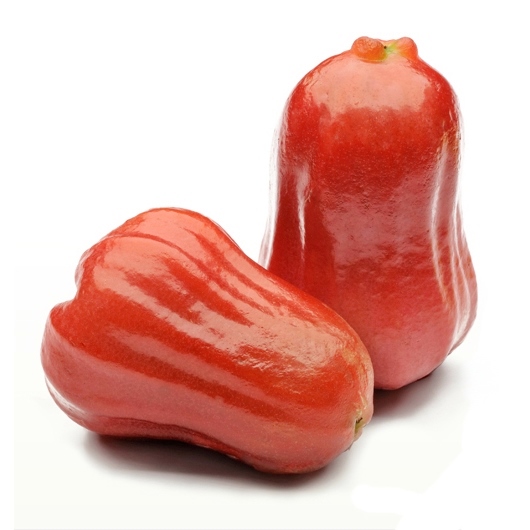

Syzygium samarangense is a plant species in the family Myrtaceae, native to an area that includes the Greater Sunda Islands, Malay Peninsula and the Andaman and Nicobar Islands, but introduced in prehistoric times to a wider area and now widely cultivated in the tropics. In Indonesia it is known as Jambu Air.
Common names in English include Java apple, Semarang rose-apple and wax jambu.
Syzygium samarangense is a tropical tree growing to 12m tall, with evergreen leaves
10–25 cm long and 5–10 cm broad. The flowers are white, 2.5 cm diameter, with four petals and numerous stamens. The fruit is a bell-shaped, edible berry, with colors ranging from white, pale green, or green to red, purple, or crimson, to deep purple or even black, 4–6 cm long in wild plants. The flowers and resulting fruit are not limited to the axils of the leaves, and can appear on nearly any point on the surface of the trunk and branches. When mature, the tree is considered a heavy bearer, yielding a crop of up to 700 fruits.
When ripe, the fruit will puff outwards, with a slight concavity in the middle of the underside of the "bell". Healthy wax apples have a light sheen to them. Despite its name, a ripe wax apple only resembles an apple on the outside in color. It does not taste like an apple, and it has neither the fragrance nor the density of an apple. Its flavor is similar to a snow pear, and the liquid-to-flesh ratio of the wax apple is comparable to a watermelon. Unlike either apple or watermelon, the wax apple's flesh has a very loose weave. The very middle holds a seed situated in a sort of cotton-candy-like mesh. This mesh is edible, but flavorless. The color of its juice depends on the cultivar; it may be purple to entirely colorless.
A number of cultivars with larger fruit have been selected. In general, the paler or darker the color, the sweeter it is.[clarification needed] In Southeast Asia, the black ones are nicknamed "Black Pearl" or "Black Diamond", while the very pale greenish-white ones, called "Pearl", are among the highest priced ones in fruit markets. The fruit is often served uncut, but with the core removed, to preserve the unique bell-shaped presentation. In Malay peninsula it is also used as bonsai plant as it grows well in pots and has thick trunk.
In the cuisine of Indian Ocean islands, the fruit is frequently used in salads, as well as in lightly sautéed dishes.
In India, water apples are found in East Godavari district of Andhra Pradesh near the dry land areas of Rajanagaram mandal (mainly around G.Donthamuru village surroundings). In Telugu, these are called kammari kayalu. It is called "Jambu Nerale" in Kannada and is grown in Karnataka as an ornamental plant in private gardens in places close to the western ghats. It is also found throughout Kerala where it is called as Champakka or Chambakka. It is mainly eaten as a fruit and also used to make pickles (Chambakka Achar)